edX and Coursera are both established giants in the field of online learning.
But which is best – edX or Coursera?
I’ll be looking at the similarities and differences between Coursera and edX here. Comparing their features, pricing options, instructor and course quality, and more.
Essentially, in this edX vs Coursera article I’ll provide everything you need to know to decide which of the two is better for you.
So, let’s get to it.
If you're short on time, here are the headlines:
Coursera is partnered with elite institutions such as Stanford, Yale and Google to offer 9,000+ courses (some to Master’s level). Topics include everything from science and tech to art and music. You can access a lot of content free and pay a fee to receive an accredited certificate. Unlike edX, Coursera also offers a subscription which gives unrestricted certified access to 90% of its library.
edX is also partnered with globally renowned institutions to provide 3,500+ courses from the likes of Harvard, Yale or IBM. The range of topics is similar, though edX offers slightly more humanities and arts courses. Like Coursera, edX also offers teaching to Master’s level and the option to take many courses free, or pay for certification. Unlike Coursera, edX does not offer a subscription.
Summary: Both platforms offer access to top notch education from the most respected institutions in the world. Both have free content and allow you to purchase courses individually. The key headline difference between Coursera and edX is that Coursera has far more courses and also offers a subscription giving unrestricted, certified access to 90% of its catalog.
We’ll go into much more detail below so you can decide which is better…
Quick Summary
This side by side comparison of edX and Coursera gives you an overview of their differences and similarities.
| edX | Coursera | |
| No. of courses | 3,500+ | 9,000+ |
| No. of students | 35+million | 92+ million |
| Teachers | Professionals from top universities and institutions | Professionals from top universities and institutions |
| Specialization | Access to university standard education | Access to university standard education |
| Pricing | If you want a certificate the Verified Track costs between $50-$300 depending on the course | – Individual courses from $49.99 – Monthly subscription: $59 – Annual subscription $399 |
| Refund | Within 14 days of purchase | 14 day refund on courses & annual subscription |
| Certificates | Yes with Verified Track | Yes for paid courses |
| Features | – Partnered with top global institutions -Access to thousands of free courses -The chance to upgrade and receive certification for a course -Wide range of disciplines -Special in-depth bootcamps and degrees | -Partnered with top global institutions -Access to thousands of free courses -Access to the community forum for support -Accredited certification for paid courses -Offers Master’s and full degrees |
| Pros | -Most content can be accessed free -Chance to upgrade to receive accredited certification -Wide range of courses and resources -Instructors from top institutions and universities | -Earn accredited certificates from the world’s top organisations -Lots of free content -Variety of learning paths plus monthly/annual subscriptions -Instructors from top universities and institutions -Community forum |
| Cons | -Relatively limited course library | – Confusing pricing |
| Best for | – Those wanting certification from elite institutions – Anyone seeking promotion or career change – Those wanting to break into the world of tech -Learners looking for open source but high-quality channels of education | -Those who value unrestricted access via a subscription package – Those wanting certification from elite institutions – Anyone seeking promotion or career change – Those wanting to break into the world of tech -Learners looking for open source but high-quality channels of education |
| More info | Visit edX | Visit Coursera |
About Coursera and edX
Before we start our proper comparison of these two sites, let's take a look at the history and features of both individually.
About Coursera
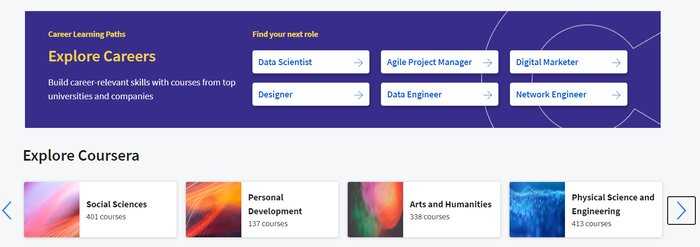
Coursera was founded in 2012. It provides certified courses led by professionals from leading institutions such as Yale, Stanford and Google.
The focus is on in-demand professional topics, but there are also courses in subjects such as languages or arts and creativity.
Cousera has 92 million registered users and is partnered with 250+ leading universities and industry educators to offer 9,000+ courses and degree programs across 11 categories.
There are many different ways to learn on Coursera. You can buy individual courses and certifications outright, take a lot of courses for free, or subscribe on a monthly or annual basis.
More than 100 Fortune 500 companies, and 6,000+ businesses, campuses and governments come to Coursera to learn.
Coursera attracted as many learners in 2020 alone as its closest competitor did in its entire existence.
For more on Coursera check out Coursera review, Coursera pricing explained, Coursera vs Udemy and Coursera Certificates – are they worth it?
About edX

edX was founded in 2012 by scientists from MIT and Harvard with a commitment to increasing education for everyone, anywhere.
Stanford joined the party in 2013, at which stage edX became an open-source of learning.
edX now has 35 million users, with 15,000 instructors and 160 partner institutions.
They have continued to provide online courses to eager learners across the world and developed new initiatives like MicroBachelors and Boot Camps for those who want to focus intensively on their learning.
Other major universities like Oxford, Cambridge, the LSE, Yale, Princeton and many, many more work with edX to provide high-quality online education.
Given this association with well-established institutions, edX tends to focus on more traditional academic subjects.
Courses are taught individually on edX, typically in partnership with an educational institution, and led by a member of the faculty from that institution.
The amazing thing about edX is that literally, anyone can choose to learn from one of their many courses, anywhere in the world, without paying a thing.
To receive a certificate for a completed course, you’ll need to join the paid verified track.
Learn more in our articles edX review and Best edX Courses.
Summary: Whilst there are many similarities between the two platforms, Coursera has twice as many courses and registered users. It has grown more quickly than edX and is the go to platform for businesses, campuses and governments to upskill their teams.
So now we’ll move on to take a closer look at edX compared to Coursera in terms of their courses.
edX vs Coursera courses
| edX | Coursera | |
| No. of Courses | 3,500+ across 15 categories | 9,000 across 11 categories |
| Categories | Art Biology Business Chemistry Computer Science Economics Engineering History Law Literature Math Music Philosophy Physics Social Science | Arts & humanities Business Data science Computer science Health Information technology Language learning Math & logic Personal development Physical science and engineering Social sciences |
| No. of Free Courses | Most – without certification | 2,500+ |
With the key info out the way, let’s take a deeper look
Coursera courses
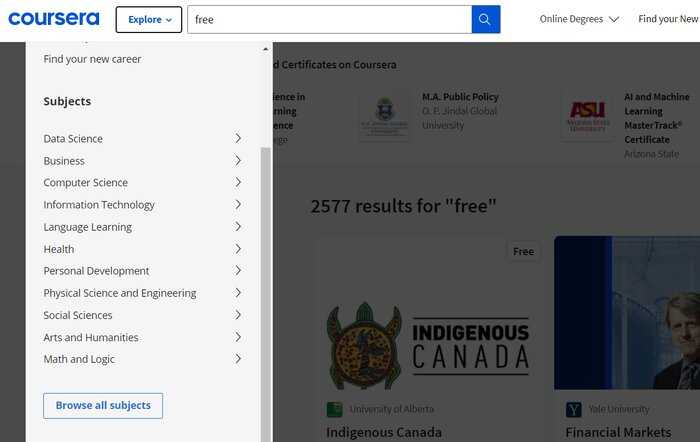
Coursera offers over 9,000 courses across eleven categories (or subjects as Coursera terms them).
It also offers users a variety of learning pathways. Briefly these are:
| Option | Goal | Length |
| Courses | Gain knowledge | 4-12 hours |
| Guided Projects | Learn a discrete practical skill | 1-2 hours |
| Specializations | Master a range of related skills | 1-3 months |
| Professional Certificates | Get job ready for a career | 4-7 months |
| MasterTrack Certificates | Learn at Master’s level and earn credit towards a full Master’s degree | 4-7 months |
| Degrees | Earn a full degree | 2-4 years |
Given the number of different learning pathways, it’s hard to generalize what learning with Coursera is like. But overall, in a typical lesson you can expect:
- Video lectures and accompanying transcripts. These can be consumed on demand in your own time
- Quizzes, questions, projects and assignments to test your progress
- Opportunities to connect with other students to discuss problems and share experiences
- Access to supporting resources such as podcasts, pdf files, e books, readings, Ted talks, case studies and examples, etc.
There are quite a few ways to navigate the Coursera platform to find what you’re looking for. You first have to sign up with an email address but this costs nothing.
After that you can use use:
- Search if you know the subjects and topics that most interest you
- What we Offer if you want to explore the different learning paths on Coursera
- Explore to browse by subject
Once you have visited the platform, Coursera will use your browsing history to suggest programs that might suit you.
Best Coursera courses
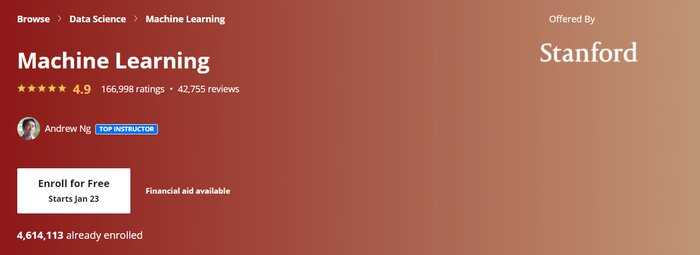
Once again, what’s best for you depends on your interests and goals. So I’ve rounded up a selection of the best Coursera courses based on the different learning paths available.
These are:
- Course: Supervised Machine Learning – Stanford University Learn what learning is, how machines do it without explicit programming, and how to apply machine learning techniques to new problems.
- Guided Project: Chat GPT Playground for Beginners: Intro to NLP AI – Coursera Project Network This guided project walks you through the process of working with the fundamental operations of ChatGPT. No coding experience required.
- Specialization: Excel Skills for Business – MacQuarie University Discover how to use Excel to solve a range of business problems, design sophisticated spreadsheets, and use advanced Excel features and techniques confidently.
- Professional Certificate: Google Data Analytics – Google Gain an immersive understanding of the practices and processes used by a junior or associate data analyst in their day-to-day job.
- MasterTrack: Social Work: Practice, Policy and Research – Michigan University Study the key research, knowledge, policy and frameworks that guide social work practice.
- Coursera Degrees: Bachelor of Science in Computer Science – University of London Master in-demand computing skills, solve complex problems, sharpen your creativity and be given the opportunity to shine in one of seven specialist fields.
Obviously, what's best for you depends on your own needs and interests so I've listed below a selection of the best Coursera programs by subject:
- Arts and Humanities – Indigenous Canada (Course)
- Business – Excel for Business (Specialization)
- Computer Science – Python for Everybody (Specialization)
- Data Science – Google Data Analytics (Professional Certificate)
- Health – Introduction to Psychology (Course)
- Information Technology -Chat GPT Playground for Beginners: Intro to NLP AI (Guided Project)
- Language Learning – Learn to Speak Korean 1 (Course)
- Math and Logic – Introduction to Mathematical Thinking (Course)
- Personal Development – The Science of Well Being (Course)
- Physical Science & Engineering – Introduction to programming the Internet of Things (Specialization)
- Social Sciences – Social Work: Practice, Policy and Research (MasterTrack)
edX courses

The first step is to sign up to edX with a username, email and password. Then you're ready to browse any of the courses on offer.
Many of edX’s offerings are completely free. However, you can upgrade to the Verified Track, where you will receive a certificate for your achievements.
To sign up for a course, simply click on the enrol tab and you have access to every lesson and resource.
You’ll be taken to a page that will ask you to select either the Free Audit or Verified Track. Select whichever one you prefer. You can upgrade to the Verified Track any time before the course deadline.
edX courses cover an incredible variety of disciplines, including:
- Art
- Biology
- Business
- Chemistry
- Computer Science
- Economics
- Engineering
- History
- Law
- Literature
- Math
- Music
- Philosophy
- Physics
- Social Science
edX also offers several programmes, including:
- Boot Camps: Focused on hands-on technical teaching.
- Executive Education: For aspiring business leaders.
- MicroMasters and MicroBachelors: Readily accessible quality-level education.
- Professional Education: For those who are looking for more formal credentials.
These programmes often cost around the same as the Verified Track course but can go up to $1,000 to $3,000. They will typically include one or several individual courses and often go into more depth.
Best edX courses
Here are the most popular courses on edX right now:
- HarvardX’s Introduction To Computer Science
- MIT’s Introduction To Computer Science And Programming Using Python
- ETSx’s Test Preparation: The Insider’s Guide
- Harvard’s Web Programming With Python And JavaScript
- The Linux Foundation’s Introduction To Linux
As you can see, most of these are geared towards the tech and computer world. This makes sense as these skills are increasingly in demand and many of us are looking for ways to retrain for the modern economy.
But don’t forget, edX offers courses on a much wider range of disciplines.
With this in mind, I’ve highlighted some of the top courses for edX’s many categories.
- Art And Culture: Hollywood, History, Industry, Art (University of Pennsylvania)
- Biology: Introduction To Biology-The Secret Of Life (MIT)
- Computer Science: HarvardX’s Introduction To Computer Science (Havard).
- Economics: Macroeconomics-The Basics (Doane University)
- Engineering: A Hands On Introduction To Engineering Simulations (Cornell)
- Nutrition And Health: Cancer (Wageningen)
- History: Tangible Things-Discovering History Through Artworks, Artifacts, Scientific Specimens And The Stuff Around You (Harvard)
- Humanities: Introduction To Digital Humanities (Harvard)
- Law: International Law-Who needs law school? (UCLouvain)
- Literature: Shakespeare’s Life And Work (Harvard)
- Math: Linear Algebra Parts 1-4 (Georgia Institute of Technology)
- Music: Introduction To Music Theory (Berklee)
- Philosophy: Introduction To Animal Ethics (Kyoto University)
- Physics: Pre-University Physics (TUDelft)
- Social Sciences: Us Vs. Them-Why People Polarize And How To Bring Them Together (Jesus College, Cambridge)
Summary: Both platforms offer courses in similar topics from equally prestigious providers. Both also offer a range of course types from bite sized through to degree level. Signing up to either platform (with no obligation) will allow you to sample lots of content for free, so in terms of courses alone, it will be your personal choice that decides.
edX vs Coursera teachers & course quality
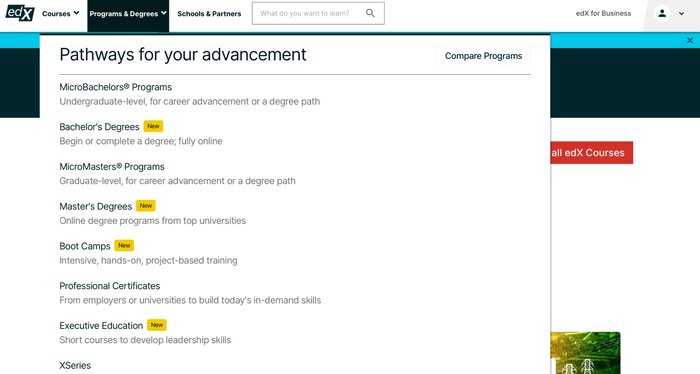
It’s clear that both sites offer an amazing range of courses, but this doesn’t count for so much without actual quality lessons.
So, let’s take a look at the teacher and course quality of both of these sites.
edX teachers and quality
edX has partnered with 160+ universities and institutions of higher learning. This is the platform’s main selling point.
Some of the best universities in the world collaborate with edX on their courses, including:
- Harvard
- Oxford
- MIT
- Cambridge
- Yale
- The LSE
- Princeton
- Stanford
- Columbia
- Sorbonne
- Imperial College London
And many, many more.
Having these kinds of partnerships results in your courses being led by the same instructors who teach in these institutions. They are leaders in their field who know exactly what they are talking about and also have years of experience in actually delivering their content, which is just as important.
The open source nature of edX, and the variety of institutions supporting it, means no lesson is the same.
However, edX does put a lot of effort into making each course live up to a particular standard. So you can expect a couple of features across each course.
Courses on edX typically include a mix of video and textual classes. Once you’ve read the text or completed the video, you’re free to move on to the next lesson.
You’ll also typically receive a combination of assignments for you to participate in by a particular time, which may be graded if you choose the Verified Track. These can take the form of questionnaires, case studies or written assignments.
Coursera teachers and quality

Coursera is partnered with 250+ of the world’s top universities and institutions. These include Yale, Stanford, Google and IBM.
It is top trainers and academics from these institutions that provide the teaching on Coursera.
Amongst them are:
- Nobel prize winners
- Best selling authors
- Academics from prestigious universities such as Princeton and Yale
- C-suite executives from the world’s leading companies
- Practising experts in their respective fields
At the time of writing the average course rating for a Coursera course was 4.7/5.
Summary: Both Coursera and edX have high profile instructors teaching their courses. So there is little to choose between them on this criteria alone. If there is a particular institution you are interested in learning from you can check to see if they offer courses on either platform.
edX vs Coursera : pricing
| edX | Coursera | |
| Subscription | N/A | $59 pm or $399 for a year for access to 90% of the Coursera catalog |
| Individual Course Cost | Between $50 to $500 on the Verified track | Courses: from $49 Guided projects: from $9.99 Specializations and Professional Certificates: from $39.99 pm Degrees: from $9,000 |
| Free Trial | Free audit option on most courses | 7 day free trial on subscriptions, Specializations and Professional Certificates |
| Free Courses | Most are free to audit | 2,000+ free courses without certificates |
| Discount | Coursera discounts | |
| Refund | Yes (either within 14 days of purchasing or 14 days after course starts) | 14 day refund on courses & annual subscription. Monthly subscription can be cancelled any time. |
| More Info | Visit edX | Visit Coursera |
edX cost

How much you pay for edX’s services will depend on what you’re looking for.
If you just want to learn from the courses themselves, without the certificate or any paid for content, then that will cost nothing.
The Verified Track, where you receive a certificate and the opportunity for feedback on your assignments, typically costs between $50 to $300. This price is similar for edX Boot Camps.
For more in-depth programs, like the MicroBachelors, Executive Education and Professional Education, the cost can be around the same. But it can also go up to $1,000 to $3,000 depending on the course provider and how long the course is.
edX isn’t a subscription service, so you pay for each course individually.
Coursera cost
Because it provides so many learning pathways, Coursera’s pricing structure can seem confusing. It is explained fully in our article Coursera cost. But in summary:
- Coursera Plus subscription: gives you unlimited access to 90% of the Coursera catalogue. It costs either $59 monthly, or $399 up front for the year
- Courses: can be taken for free. If you wish to receive a certificate you can purchase the course. Coursera Courses start at $49
- Guided Projects: are designed to teach a specific skill and start at $9.99 each
- Coursera Specializations and Professional Certificates: Both these options start at $39 per month – how much you pay depends on how long it takes you to complete the course
- Coursera MasterTrack: These are modules taken from a full Master’s program and count towards the full Master’s degree if you want to take things further. They start at $2,000 for the full module
- Coursera Degrees: are full online bachelor’s degree and master’s programs from leading universities. Tuition fees for a Coursera degree start at $9,000 for the full program. You pay as you go for the courses you are enrolled in each term
Coursera also offers:
- Seven day free trials with:
- Coursera Plus monthly subscription
- Specializations
- Professional Certificates
- And 14 day money back guarantees on most of its products. However, if you complete a course and earn a certificate within that 14 day period Coursera reserves the right to withhold a refund
Summary: In terms of which is cheaper, edX or Coursera, costs are broadly similar. However, Edx’s pricing is easier to understand. This is partly to do with the number of learning pathways that Coursera provides, and partly because some of Coursera's free content is a little harder to find. To get the most value out of Coursera check our article, Coursera pricing clearly explained.
edX vs Coursera certificate value
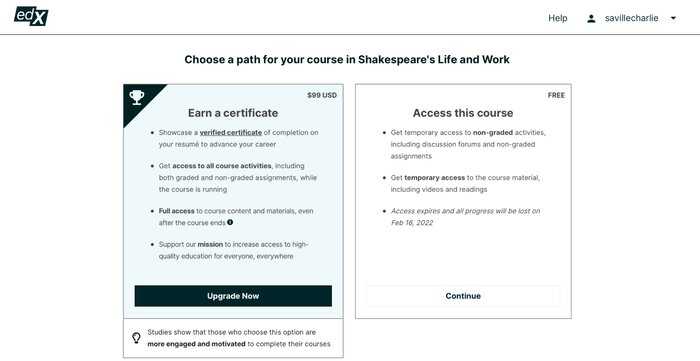
Both sites offer certificates with their paid courses. These can be key to demonstrating the skills you’ve developed through taking your course.
A Coursera Certificate is issued by whichever partner institution has provided the course. Since Coursera’s partners are all top universities or companies, Coursera certificates do provide official recognition from accredited institutions.
You can read more about the value of a Coursera certificate in our article Coursera Certificate: How it works and is it worth it?
You can also receive an accredited edX certificate if you pay for a course using the verified track.
You will receive the certificate upon completing the course as well as passing any assignments that are set as part of this, although this will vary by course.
You must apply for the certificate (by switching to the verified track) before the course expires and is archived. The course expiry date will appear on the homepage before you sign up.
Summary: Coursera and edX both offer fully accredited certification with paid courses. The prestige of the institutions providing the certificates across both platforms gives them equal value.
edX vs Coursera features
Let’s take a closer look at what features each platform offers.
edX features
- 3,500 courses
- 160+ prestigious partner institutions including Harvard, MIT and Stanford
- Teaching from leading academics and professionals
- Access to thousands of classes for free
- The chance to upgrade and receive certification
- An incredible range of disciplines
- Partnerships with the world's leading educational institutions
- Special programs that go in-depth
- Teaching to degree and Master’s level
- A variety of teaching methods
Coursera features
- 9,000 courses and degrees with a strong focus on professional skills
- 250 prestigious partner institutions including Yale, Harvard, Caltech, Google and Accenture
- Teaching from leading academics and professionals
- Variety of learning pathways
- Courses to buy singly or monthly/annual subscriptions
- Accredited certification for paid courses
- 2,500+ courses that can be taken free
- Access to a community forum of fellow learners to collaborate, ask questions and share successes
- A variety of teaching methods
edX vs Coursera customer support
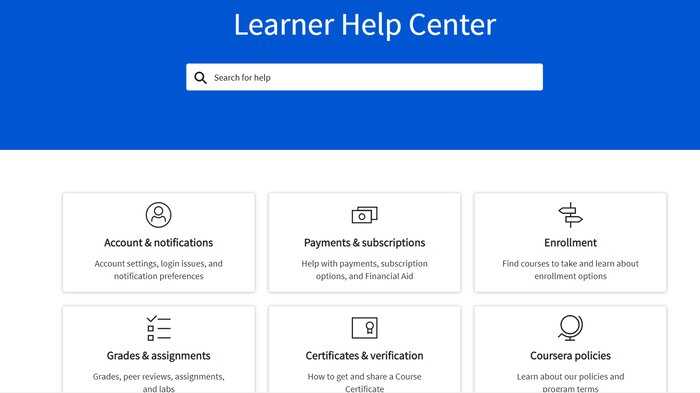
Although both sites are designed for learners to navigate with ease, sometimes problems or technical difficulties can arise.
Good customer support can be an important part of your learning experience as a result.
Coursera’s Help Center can be found at the bottom of the home page. It includes prompts for whatever aspect of the site you need help with. It also provides a link to the Coursera Community where you can ask questions and seek support from fellow students.
The first port of call for customer support with edX is the Help Center. Like Coursera, this provides you with a search tab as well as a series of FAQs and topics to help you solve your problem.
If that doesn’t solve it, you can contact both platforms directly, although you’ll need to create an account first.
edX vs Coursera: which is best for Businesses?
Both Coursera and edX emphasize the way their courses are designed for the changing world of work and offer plans specifically for businesses.
| edX | Coursera | |
| Small teams | Purchase group coupons for courses by purchasing a course and requesting multiple enrolment codes. | Team Plan $399 per user per year5,000 courses, 100 skillsets & 1,900 guided projects |
| Medium to large teams | Contact the edX team on the edX for Business page for custom pricing and offers | Enterprise Plan – No fixed price, contact sales – As above + job based learning programs, authoring tools, an account manager and user analytics |
edX and Coursera alternatives
edX and Coursera aren’t the only online education sites.
Below we’ve selected three alternatives that also provide online education, but have features that make them stand out from edX and Coursera.
Udemy
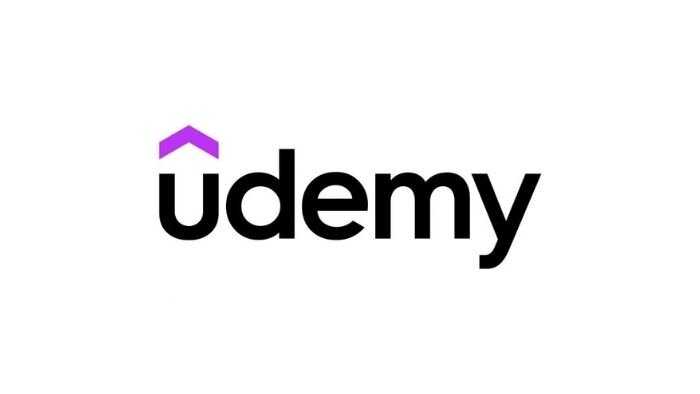
Udemy is one of the most popular online education platforms in the world, combining some of the best features of edX and Coursera.
Like both, Udemy is leading the way in terms of providing education that will equip you for the changing nature of work and business.
Thousands go to Udemy to learn how to code, develop their office administration skills and much more.
Like edX, courses are sold individually, and over 500 are completely free. It does differ in that it allows anyone, after careful vetting, to offer courses on its platform, though it too has high profile contributors.
For more information check out our articles Udemy vs Coursera, Udemy review, Best Udemy Courses and Udemy Sales.
Skillshare

Like Udemy, Skillshare allows anyone to create and offer a course on their platform. It offers 40,000 courses with a very strong focus on creativity. In fact it's the world’s largest online community for creativity – with over 13 million registered users.
Skillshare's renowned for its classes in creative disciplines such as Photography and Sketching, but also offers courses in fields such as Business and Productivity. It's been featured in Forbes, the NYT and Business Insider.
Skillshare is a subscription only platform, which may work better for some learners who will then have unrestricted access to all its courses.
MasterClass
MasterClass is quite different compared to edX and Coursera.
MasterClass offers classes hosted by global icons in their field. For example, Gordon Ramsay, Margaret Atwood and Herbie Hancock. The focus is on the experience, rather than academic learning, and the platform is famed for its incredibly high-quality production values.
MasterClass have also started to offer MasterClass Sessions which are project led, practical 30 day courses that you start with a cohort of fellow students who you feedback to, collaborate with, and receive feedback from.
MasterClass is a subscription only platform and your annual pass gives you access to every MasterClass including the Sessions.
edX vs Coursera pros, cons, and best for
We’ve covered most of the information about edX and Coursera in depth.
So here’s a quick summary of both of their pros, cons and who they're best for.
edX
Pros:
- Open-source learning; a lot of the content is totally free
- The chance for certification from leading institutions
- Wide range of courses and resources
- Instructors from the world’s top institutions
- Covers professional and personal development
Cons:
- Smaller course library than Coursera
Best for:
- Casual learners with full schedules looking to fit in some learning whenever they can
- Anybody looking to retrain with a tech or computer science focus
- Business teams and business leaders looking for in-depth education resources
- Students who would value certification from world-class universities
- Learners looking for open source but high-quality channels of education
Coursera
Pros:
- The chance to earn accredited certificates from the world’s top organisations
- Lots of free content for you to sample
- Offers lots of learning paths as well as monthly or annual subscription
- Instructors from top universities and institutions
- Has a community forum where you can ask questions and share successes
- 81% of learners give its courses a 5* rating
Cons:
- Confusing pricing due to so many ways to learn
Best for:
- Students who would value certification from world-class universities and institutions
- Learners looking for open source but high-quality channels of education
- Anyone looking for promotion, a new job or a career change
- Those looking to open new doors into the world of tech or computer science
- Busy people looking to fit in some high quality learning at a time that suits them
- Business teams and business leaders looking to invest in the continuing professional development of their teams
Conclusion: edX vs Coursera
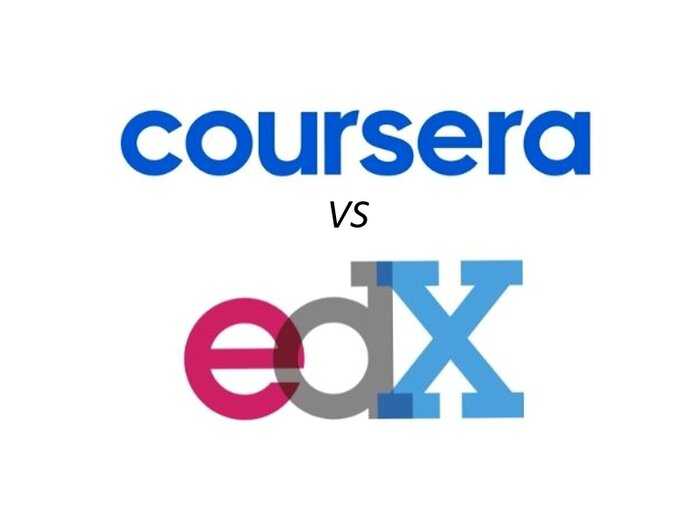
It’s clear that these sites both have a lot to offer, so which one is best overall?
In summary, comparing edX to Coursera:
Coursera vs edX Differences
- Coursera’s courses offers more courses and a greater variety of learning paths
- Coursera offers a subscription giving unrestricted certified access to 90% of its catalog.
- edX’s pricing structure is a little more transparent and easier to understand
Coursera vs edX Similarities
- Both edX and Coursera deploy teachers who are experts in their field
- Certificates of completion are accredited on paid courses for both platforms
- There is a large volume of free content and the opportunity to buy courses individually on both edX and Coursera
So, the answer to the question: “Which is better – Coursera or edX?” really comes down to what you’re looking for.
If you are looking for a straightforward, easy to understand platform that enables you to take most courses for free and upgrade to receive certification then edX is likely to be your best bet.
If you’re looking for a platform with a huge catalog and a wide range of learning paths then Coursera might be better. Especially if a subscription option giving you unfettered, certified access to 90% of what’s on offer appeals to you.
The good news is that both platforms offer:
- Plenty of free content for you to sample before committing yourself
- The opportunity to buy courses individually so you can dip in and out of each
- Free trials and refunds minimizing your risk of paying for something you don’t benefit from
I would advise exploring the free content on both platforms before committing yourself.
Comparing edX vs Coursera: our methodology
To make this a fair comparison, I’ve spent a lot of time researching both edX and Coursera.
I’ve assessed both platforms in their own right, whilst also considering other, similar sites in order to properly get a sense of the overall strengths and weaknesses I need to look out for.
My research included taking courses, reading other reviews, researching the instructors and teams behind both sites and spending a lot of time browsing what was on offer.
Ultimately, this gave me a good understanding of the benefits and drawbacks of both Coursera and edX, and how they compare with each other.
Hopefully sharing my experience has helped you decide for yourself.
Coursera vs edX – FAQ:
By a thin margin, Coursera. Due to its larger course catalog.
Both platforms offer a lot of free content but edX’s is easier to find and access. Costs for paid content are broadly similar though a Coursera Plus subscription could save you money if you take full advantage of it.
Coursera has twice the number of courses compared to edX

Liz Hurley has 30+ years of high school teaching experience and is one of our senior writers here at Learnopoly.

Thank you for your valuable and detailed comparison. In my case I will compare each specific course on both platforms, it really depends on the individual goals. Best wishes from Colombia.
Wow Thanks for this post i find it hard to acquire extremely good particulars out there when it comes to this material thank for the article site
Thank you so much! I’m really glad you found the post helpful. It means a lot to know that the information was useful to you. If there’s anything specific you’d like to learn more about, feel free to ask!
This web site is really a walk-through for all of the info you wanted about this and didn’t know who to ask. Glimpse here, and you’ll definitely discover it.
Thank you! 😊 I’m so glad you found the information you were looking for. I strive to make the content as helpful as possible, and I appreciate your feedback! If you need any further details, feel free to reach out.
I am commenting to let you know what a perfect discovery my wife’s girl undergone reading yuor web blog. She came to understand so many things, which include how it is like to have an amazing coaching style to let other individuals without difficulty grasp a variety of problematic topics. You actually did more than my desires. Many thanks for producing the useful, safe, revealing not to mention fun tips on the topic to Lizeth.
Thank you so much for your thoughtful message! It truly means a lot to hear that Lizeth found the content helpful and engaging. I’m so glad she was able to gain valuable insights, and I appreciate your kind words of support. Wishing her all the best in her learning journey!
Some truly prime blog posts on this web site, saved to favorites.
Thank you so much! 😊 I truly appreciate you saving it to your favorites. Glad you enjoyed the posts—hope you keep finding valuable content here!